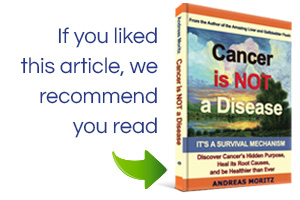By Andreas Moritz
I fervently challenge the statement that cancer is a killer disease. Furthermore, I will demonstrate that cancer is not a disease at all. Many people who received a ‘terminal’ cancer sentence actually defied the prognosis and experienced complete remission.
George, my first kidney cancer patient was one of them. His doctors at one of the most prestigious university hospitals in Germany had just ‘given’ him three more weeks to live when he sought me out for help. According to them, his cancer was too advanced and widespread to consider having treatments of chemotherapy or radiation.
George had lost one of his kidneys to cancer one year earlier. After emerging from the operating room, his doctors gave him a ‘clean bill of health’. They used the famous ‘we got it all’ expression, which made a lot of sense to George; after all, they had removed the tumor, along with the entire kidney. Nevertheless, several months later his second kidney also started filling up with cancer, and the only ‘reasonable’ advice they had for him was to take care of his personal affairs.
Fortunately for George, he didn’t die. In total defiance of the death sentence that his doctors had given him, George felt that there should be something else he could do to at least extend his life by a few months. Within a mere three weeks of dealing with the causes of his illness, the cancer receded to a tiny speck, and during his next major check-up at the German cancer clinic six months later, was nowhere to be found! Fifteen years later, George still enjoys a state of perfect health, with no indication of a malfunctioning kidney.
I had given George neither a diagnosis nor a prognosis. What would have been the point of telling him how bad and hopeless his situation was? Besides, a doctor’s ‘objective’ statement that his patient’s cancer is terminal (leading to his death) is actually a purely subjective viewpoint of a highly unpredictable situation. The doctor ties his so convincing and final judgment largely to past observations he has made with previous patients who suffered from similar symptoms. All this judgment does, however, is rule out the chance of recovery as a result of undergoing alternative treatments unknown to the treating physician. Just because the relatively young Western system of medicine does not know how to treat cancer successfully, does not imply that the ancient forms of medicine are helpless, too.
In orthodox medicine, patients are not encouraged to expect a spontaneous remission of their cancer. Doctors want to avoid giving them ‘false’ hope, if there can be such a thing as false hope. Either there is hope or there is none, but hope cannot be wrong or false. The future is not written in stone. Nobody in this world can predict with complete certainty what is going to happen in the near or distant future.One may come up with a good guess of what the most likely probabilities might be, but none of these carry the stamp of absolute certainty. A young man with an extremely rare and inoperable large brain tumor, whose story was recently documented on prime time live television in the US, defied the prognosis of a very short life and continues to live quite actively and healthily several years afterward. He even got married recently.
To avoid the complications that arise from diagnosing diseases, such as making a person believe he is a helpless victim of some sort, I merely encouraged and motivated George to attend to the various factors responsible for causing and promoting cancer growth in the first place. Subsequently, his body naturally started to take care of the details, which included removing the symptom, cancer, in this case-a rather minor feat once the causes of the cancer were no longer present.
The total remission of George’s cancer was neither the result of curing what appeared to be a horrible, self-perpetuating disease, nor was it a miracle. It was a simple process of giving back to the body what it needed to return to its most natural and normal state of balance. George merely ended the reasons why his body needed to fight for its life. As simple as it sounds, he healed himself by taking responsibility for all aspects of his life, including his body. The lesson that can be learned from George’s experience is that true healing requires you to stop fighting; for fighting is what actually prevents a true cure.
——————————
This is an excerpt from my book CANCER IS NOT A DISEASE! – IT’S A SURVIVAL MECHANISM
——————————
You may share or republish this article provided you clearly mention the name of Andreas Moritz and paste a hyper link back to the web page

